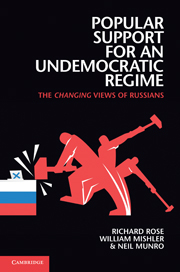Book contents
- Frontmatter
- Contents
- List of figures
- List of tables
- Introduction: The need for popular support
- 1 Democratic and undemocratic models of support
- 2 Changing the supply of regimes
- 3 Putin consolidates a new regime
- 4 Increasing support for an undemocratic regime
- 5 Individual influences on regime support
- 6 Time tells: there is no alternative
- 7 Finessing the challenge of succession
- 8 The challenge of economic reversal
- 9 Maintaining a regime – democratic or otherwise
- Appendix A New Russia Barometer samples
- Appendix B Coding of variables
- References
- Index
9 - Maintaining a regime – democratic or otherwise
Published online by Cambridge University Press: 05 June 2012
- Frontmatter
- Contents
- List of figures
- List of tables
- Introduction: The need for popular support
- 1 Democratic and undemocratic models of support
- 2 Changing the supply of regimes
- 3 Putin consolidates a new regime
- 4 Increasing support for an undemocratic regime
- 5 Individual influences on regime support
- 6 Time tells: there is no alternative
- 7 Finessing the challenge of succession
- 8 The challenge of economic reversal
- 9 Maintaining a regime – democratic or otherwise
- Appendix A New Russia Barometer samples
- Appendix B Coding of variables
- References
- Index
Summary
The intent of an authoritarian regime is not to prepare the way for democratic rule but to maintain its power. While the actions of Communist reformers had the unintended consequence of destroying their regime, there are many examples of long-lived authoritarian regimes. Thus, it is important to understand to what extent undemocratic regimes are durable.
A multiplicity of causes can put an end to a regime. A war gives victors the opportunity to replace the defeated regime with one more consistent with the winner's interest. Thus, after World War II the three Western allies promoted the establishment of the democratic Federal Republic of Germany, while the Soviet Union promoted the establishment of a Soviet-style and grossly misnamed German Democratic Republic. National independence movements have succeeded in voiding undemocratic colonial regimes. However, many regimes in newly independent states have been undemocratic. Civil wars pit domestic supporters of competing regimes against each other; the victor may introduce a dictatorship, as in Franco's Spain, or disputes may be transferred to the ballot box, as in Northern Ireland. In an undemocratic regime a falling out within the political elite can lead to the repudiation of the regime. However, the successor regime need not be democratic. Middle Eastern countries have frequently had changes in regime, as one undemocratic regime replaces another (Posusney,2004). Turkey and some Latin American states have shown that it is possible to oscillate between short-lived military rule and rule by elected politicians.
- Type
- Chapter
- Information
- Popular Support for an Undemocratic RegimeThe Changing Views of Russians, pp. 156 - 176Publisher: Cambridge University PressPrint publication year: 2011

